| SHADOWS ON THE WALL | REVIEWS | NEWS | FESTIVAL | AWARDS | Q&A | ABOUT | TALKBACK | |||||
 Shadows off the beaten path Shadows off the beaten pathIndies, foreign, docs and shorts...
On this page:
BOTH SIDES OF THE BLADE |
BUTTERFLY VISION |
PAMFIR
| |||||
| See also: SHADOWS FILM FESTIVAL | Last update 21.Aug.22 | |||||
|
Both Sides of the Blade Avec Amour et Acharnement | aka Fire Review by Rich Cline | 
| |||||
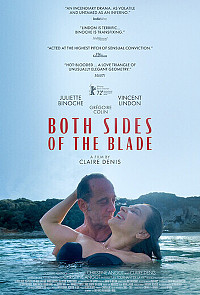 dir Claire Denis prd Olivier Delbosc scr Christine Angot, Claire Denis with Juliette Binoche, Vincent Lindon, Gregoire Colin, Bulle Ogier, Issa Perica, Alice Houri, Mati Diop, Bruno Podalydes, Lola Creton, Richard Courcet, Hana Magimel, Arturo Giusi-Perier release US 8.Jul.22, Fr 31.Aug.22, UK 9.Sep.22 22/France 1h56 BERLIN FILM FEST Is it streaming? |
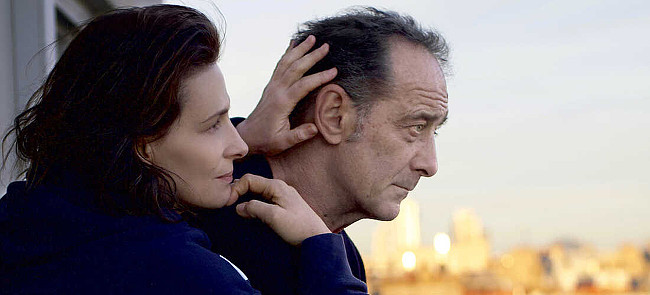 Bold and complex, this French drama depicts emotions and relationships in ways that are often startling, largely because we expect movies to simplify these things. It's rare to see serious clashes on-screen in which no one is the bad guy, and master filmmaker Claire Denis tells this story with an unblinking eye, remaining knowingly close to the characters to allow the audience to viscerally experience each high and low. After a relaxing holiday at the seaside, Sara and Jean (Binoche and Lindon) return to their small Paris flat feeling refreshed. But things quickly turn tense when Sara's ex Francois (Colin) turns up, offering Jean a badly needed business opportunity. It's been 10 years, and Sara has her lingering feelings toward Francois under control, but Jean can't cope with the fact that she still has any feelings at all. And there are other worries, as Jean's 15-year-old son Marcus (Perica), who lives with Jean's mother (Ogier), is making decisions that could derail his future. Moments simmer with emotion, from giddy surges of love to darkly inappropriate yearning to pangs of crippling jealousy. Sara, Jean and Francois share a past, and the script is deliberately elusive about details, including why Jean spent a stretch in prison. So their interaction ripples with intrigue, revisiting old connections and creating new tensions. Cinematographer Eric Gautier shoots this largely in hand-held closeup, which puts us right into the characters' faces to catch each glance, whether it's furtive or supportive. Binoche and Lindon reveal the messy internal lives of Sara and Jean, creating a vivid sense of chemistry between them along with a clear-eyed honesty due to events they have weathered over the years. So it seems impossible that Francois could cause a rift between them. Calm and cool, Colin's Francois enters the film slowly, observed from a distance until he cracks into both Sara's and Jean's inner thoughts. Whether or not he's a deliberate provocateur is irrelevant: he rattles both of them deeply. Scenes unfold with an often staggering realism, shifting back and forth as the characters address issues from their own perspectives. This gives many of the dramatic scenes a proper intensity that gets deep under the skin, mainly because we can understand each person's point of view. As a result, even the most painful encounters have an almost exhilarating quality to them. And the way the film unpicks the layers and unpredictable repercussions of love is staggering.
| ||||
|
Butterfly Vision Review by Rich Cline | 
| |||||
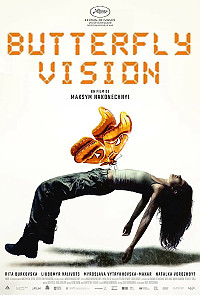 dir Maksym Nakonechnyi scr Maksym Nakonechnyi, Iryna Tsilyk prd Yelizaveta Smith, Darya Bassel with Rita Burkovska, Liubomyr Valivots, Myroslava Vytrykhovska-Makar, Natalka Vorozhbyt, Kateryna Pryimak, Dmytro Lozovskyi, Myroslav Hai, Alina Hordieieva, Larysa Klochko, Daria Lorenci Flatz, Edvin Liveric release WP Cannes May.22 22/Ukraine 1h47 CANNES FILM FEST Now streaming... |
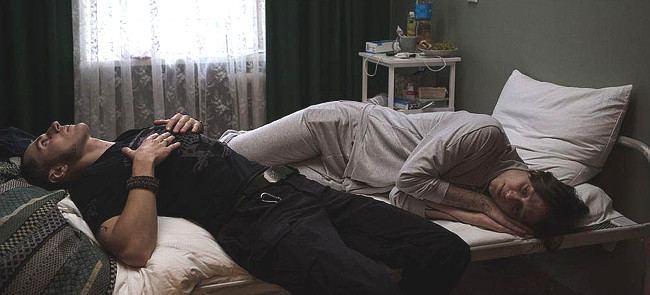 Beautifully observed with a sharp attention to detail, this Ukrainian film is packed with powerful issues but plays out matter-of-factly, without exaggerated melodrama. Set during Russia's long campaign in Donbas, before this year's invasion, the film is less timely than timeless, with scenes that are packed with complex issues and personal nuance. And as it takes on bigger ideas, this clear-eyed but over-serious film becomes often unnervingly resonant. Heading home after two months as a prisoner, 29-year-old military drone pilot Lilia (Burkovska), called Butterfly by fellow soldiers, thanks the public for supporting those who are fighting for Ukraine's freedom. Then during a routine medical checkup, she's told that she has become pregnant after being raped by one of her Russian captors. Her husband Tokha (Valivots), who was also captured but released earlier, reacts with rage. But Lilia is too traumatised to get an abortion or report this as a war crime. As she plots a path forward, the future isn't looking very bright. Strikingly, director-cowriter Nakonechnyi uses a range of heightened visual cues throughout the film, such as playing out Lilia's homecoming as a social media stream. Scenes are set with drone's-eye views (which eerily echo sonograms), while flashbacks flicker like video interference, and dream sequences bring Lilia's butterfly to life. One of these nightmares features a chillingly bombed-out Kyiv. Meanwhile, the soldiers greet each other with "Glory to Ukraine, glory to the heroes", depicted as hollow jingoism that cuts into Lilia's soul. This certainly isn't an optimistic portrait of Ukrainian society. Wounded and stoic with a grey streak in her cropped hair, Burkovska beautifully underplays Lilia's inner turmoil, quietly drifting through scenes but always on-edge. Her interaction feels offhanded, but quickly becomes jumpy, revealing that home is no longer a safe space. This is especially apparent as she notices prejudice all around her. Valivots finds a strong balance between Tokha's sensitivity toward Lilia and the hot-headed tendencies that see him go on trial after his private militia launches in a racist attack. While the film feels blunt in its approach, it's actually a deeply layered look at a society in crisis, under attack both from within and from outside. This is perhaps most vivid as Tokha watches Russian propaganda YouTube videos that vilify both him and Lilia. And there is a string of thumbs-up when he streams his group's raid on a Roma encampment. Where this story goes is often harrowing, repeatedly questioning ideas of patriotism and warped social values that sideline individual feelings.
| ||||
|
Pamfir Review by Rich Cline |  MUST
MUST  SEE SEE
| |||||
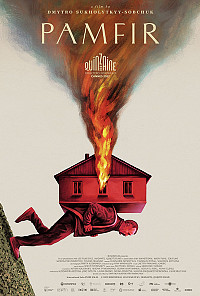 dir-scr Dmytro Sukholytkyy-Sobchuk prd Aleksandra Kostina with Oleksandr Yatsentyuk, Stanislav Potiak, Solomiya Kyrylova, Olena Khokhlatkina, Myroslav Makoviychuk, Ivan Sharan, Oleksandr Yarema, Andrii Kyrylchuk, Ihor Danchuk, Petro Chychuk, Kateryna Tysiak, Viktor Baranovskiy release WP Cannes May.22 22/Ukraine 1h43 CANNES FILM FEST Is it streaming? |
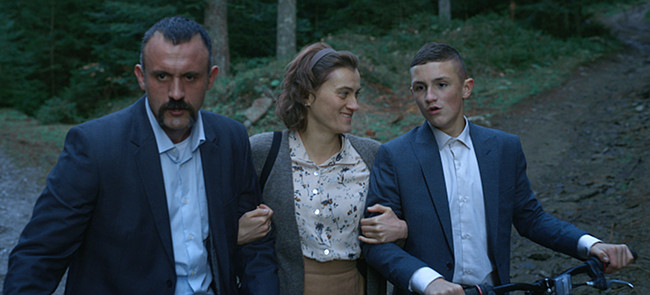 A fascinating story about a tight-knit rural Ukrainian family, this drama is skilfully written and directed by Dmytro Sukholytkyy-Sobchuk to find beauty in a range of unexpected settings. The story bristles with earthy drama, sparky humour and underlying suspense, while the filmmaking has an emotional elegance that gets deep under the skin. The generational elements in the narrative carry a powerful resonance, right to the wrenching, elaborately staged conclusion. Returning home to Western Ukraine after finding higher paying work in Poland, Pamfir (Yatsentyuk) is happily reunited with his wife Olena (Kyrylova) and lively teen son Nazar (Potiak), as well as his parents (Khokhlatkina and Makoviychuk) and younger brother Victor (Sharan). Wanting him to stay in town for the carnival, Nazar burns his documents, but the fire spreads through the local church. And now Pamfir must reconnect with his criminal past to clean up the situation. But the local gang doesn't want him back in business, and they intend to teach him a harsh lesson. Sumptuously photographed in complex widescreen takes by cinematographer Nikita Kuzmenko. Each scene ripples with gorgeous visual details that feed into a textured depiction of a deeply religious society in which the carnival is brazenly pagan and everyone knows how to break the rules. In fact, they're all calmly involved in ever-shadier business dealings. "Only old folks and kids don't smuggle here," Pamfir sighs when Victor hires two teens to move a shipment. Meanwhile, the script cleverly fills in backstories with offhanded dialog. Each actor is magnetic, revealing a fully realised internal life. Wry humour runs through most scenes, adding to the emotion while building intensity. Yatsentyuk brings likeable swagger to Pamfir, even when this confidence puts him in danger. And he has an electric connection with his family. Kyrylova adds a fiery honesty to Olena, while Potiak gives Nazar an amusingly stubborn intelligence and Sharan's Victor has some surprises of his own. All of them have heart-stopping moments, as do several smaller side characters who pop up along the way. In this culture, it's impossible to survive without breaking a few laws here and there, and the cops are complicit in everything. Along with this matter-of-fact dodginess, the film reflects the strong male gaze of this society, particularly in a sex scene. Sukholytkyy-Sobchuk has a wonderfully astute eye, infusing scenes with colour and offbeat intrigue, building a harrowing sense of menace while never over-egging the violence. And most importantly, he never loses track of the involving, remarkably layered family drama at the centre of the story.
| ||||

See also: SHADOWS FILM FESTIVAL © 2022 by Rich Cline, Shadows
on the Wall
HOME | REVIEWS | NEWS | FESTIVAL | AWARDS
| Q&A | ABOUT | TALKBACK | | ||||
